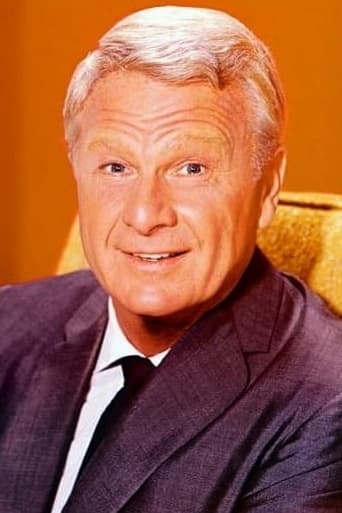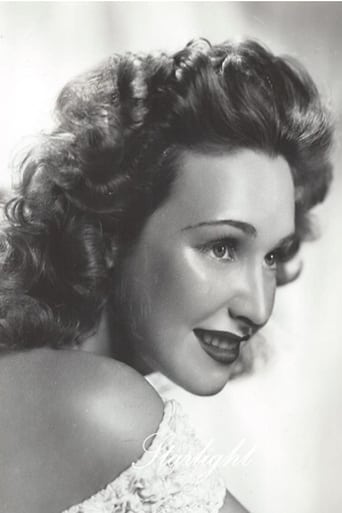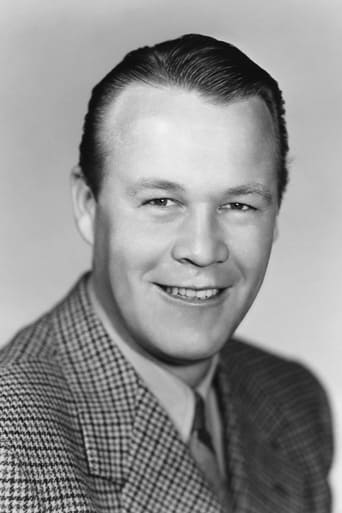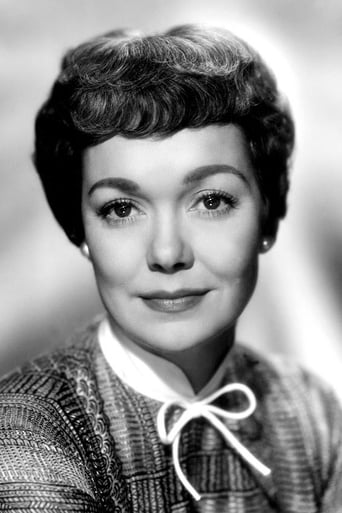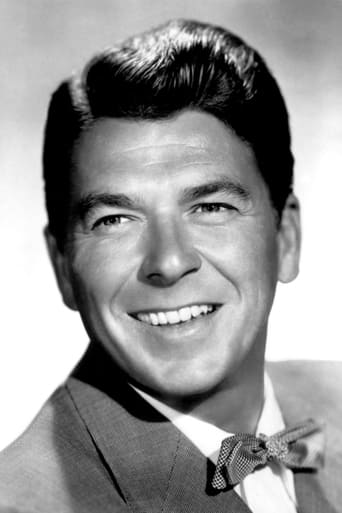TrueJoshNight
Truly Dreadful Film
Titreenp
SERIOUSLY. This is what the crap Hollywood still puts out?
Kailansorac
Clever, believable, and super fun to watch. It totally has replay value.
BelSports
This is a coming of age storyline that you've seen in one form or another for decades. It takes a truly unique voice to make yet another one worth watching.
JohnHowardReid
The running time of 70 minutes indicates that this film was intended as a "B"-feature, or at best as the top half of a strong double bill. Yet, by "B"-feature standards, it has been rather lavishly produced. It opens in the hamlet of Lone Star, Texas, where a couple of hundred of the citizenry have gathered to farewell the heroine. Soon afterwards, we find ourselves plumb in the centre of the jostling, crowded streets of New York City, and it is not until that scene has concluded that we pick up Messrs Reagan and Morris and not until they have had a run-in with Hobart Cavanaugh that the curtain finally opens on the interior of their office (where it is safe to assume the original play was set). The film then settles down to lots of talking, but the impression of a filmed stage play is lessened by the rapidity of the talk, the general fast pace and swift movement of the proceedings with characters dashing madly from one door to another, and the fact that the screenwriters have opened the play up with many brief excursions to other sets and scenes. The bulk of the action however, still takes place in the office. And the fact remains that the film is still a rather talky 69 minutes. Some songs would help to provide relief. Not only could they have been inserted quite naturally into the action, they would have fleshed out the film's running time to "A"-feature length. However, we have to judge the film as it is, and not as we would like it to be. The basic idea of the plot was used again, with considerable variations, by Mel Brooks in The Producers, a much funnier and much wittier film. The plot is old-hat and the characters of An Angel From Texas are one-dimensional caricature - still, for all their lack of dimension, they are played with considerable vitality. Wayne Morris and Ronald Reagan are ideally cast as a couple of fast-talking confidence men - and they are more believable in this type of role than as the sympathetic hero figures they so often attempted to portray! Eddie Albert is perfect too as the schnook of the title and while Rosemary Lane makes little impression as the heroine there is a solid supporting cast headed by Jane Wyman (looking more attractive here than in her later films as queen of the Universal weepies), Ruth Terry (a delightfully vindictive leading lady), Hobart Cavanaugh (the put-upon Robelink), Milburn Stone (a flashy gangster), Tom Kennedy and Ralf Harolde (his amusingly sinister strong-arm boys). John Litel over-acts his brief part as an attorney, but the rest of the cast is first-rate. Ray Enright's direction is very smooth, his fast pacing and deft timing making the situations and wisecracks as funny as possible. Other production credits are likewise professionally able. The music score is pleasant, the costumes and sets reasonably attractive, the film editing unobtrusive. Enright knows when and how to use the camera to get an effect: there are some pleasing uses of the track and dolly early on in the film. Generally, however, the camerawork like the lighting photography is inclined to be routine.
zardoz-13
Wayne Morris and Ronald Reagan play a pair of fast-talking Broadway producers Mac McClure and Marty Allen in "Dames" director Ray Enright's "An Angel from Texas" who are flat broke and owe everybody money. They need to find a patsy to give them enough dough to put on their latest stage play with prima donna actress Valerie Blayne (Ruth Terry) who has the clout to count on them casting her because her hoodlum boyfriend 'Pooch' Davis (Milburn Stone of "Gunsmoke" fame) is about to be released from Alcatraz Prison. Peter Coleman (Eddie Albert) and Lydia Weston (Rosemary Lane) are a couple of clods from Texas; she dreams of seeing her name on a Broadway marquee as an actress, but the only job she can land is a secretary for the two scheming producers. Meantime, Peter Coleman is her sweetheart who saw her off on the bus from Lone Star, Texas, and is heartbroken when she appears to be the toast of Broadway but hasn't written her a line. Peter's mom gives him her life savings of $20-thousand and packs him off to New York City to buy a hotel. Unfortunately, Peter learns that New York City hotels cost at least a million apiece. He discovers his girlfriend on the street and learns that all the great critical notices that she sent him were not for shows in which she had been cast. Everybody in Lone Star thoughts that Rosemary had gotten high-handed and changed her name. Lydia didn't want the gossips back home to get wind of her misfortune.Now, she works for Morris and Reagan, and they must contend with the antagonistic Ruth Terry. Nevertheless, Mac and Marty persuade Peter to help produce the play on the condition that Lydia takes the leading lady role. During the final dress rehearsal, Lydia storms backstage with two of her boyfriend's henchmen and demands that she get the role. As it turns, out Mac and Marty had promised it to her all along and had duped the lovebirds into thinking that everything would work out. The surprise of surprises that thwarts Lydia is none other than Marty's wife Marge Allen (Jane Wyman) who had earlier won a fortune. Anyway, Mac and Mary agree to let Peter buy them out if he can drum up another $10-thousand in 24 hours. Naturally, Peter cannot persuade any of the Big Apple bankers to loan him the ten-grand. Unexpectedly, Marge gives Peter the loot if he agrees to play opposite Lydia because she thinks that it will be a successful farce. Mac and Marty happily cavort out of their office with Peter none the wiser about Valerie's boyfriend. As Mac and Marty are heading to the elevator, Lydia, and Chopper (Tom Kennedy) confront and inform them that Pooch plans to dynamite the stage. Later, we learn that Pooch doesn't plan to blow up the audience, only the actors. Pooch isn't prepared for what he sees when the play opens and he changes his mind. Mind you, even more laughs and surprises ensue.Everybody seems to think that the Mel Brooks' farce "The Producers" was the first to use the premise that Broadway producers could pull a fast one on audiences and have them laughing because a play was so bad that it was good. Clearly, Warner Brothers beat Brooks to the punch with "An Angel from Texas." Incidentally, "An Angel from Texas" was based on the George S. Kaufman stage play "The Butter and Egg Man." According to the Internet Movie Database's Trivia section, the play ran eight months, beginning September 1925 to April 1926, for a total of 243 performances. The change of title to "An Angel from Texas" doesn't necessarily refer to Lydia, but instead to Peter because he gets Lydia the starring role that she has wanted since she left Lone Star. Initially, you might not enjoy this goofy comedy if you catch only the first half-hour. Director Ray Enright and scenarists Fred Niblo, Jr., of "King of the Jungle" and Bertram Millhauser of "The Texans" never let the audiences catch their collective breaths with all the antics that are packed into this play. "An Angel from Texas" is hilarious from fade-in to fade out.
gerdeen-1
Watching this otherwise forgettable movie was a revelation, because for years I had been led to believe that Ronald Reagan always played "the good guy" until his role as a crime boss in his last film, "The Killers." Well (to use a favorite Reagan sentence-opener), that's just plain wrong. In "An Angel from Texas," the future president plays a none too likable character. He isn't a villain exactly, because it's not that kind of movie. It's supposed to be a comedy. But Reagan's character is a big-talking, overbearing jerk, the type Keenan Wynn played in so many pictures. It makes me wonder what other oddities I'll discover as I watch more Reagan movies. I guess it just goes to show that you should never listen to the pundits.
Neil Doyle
Strictly a by-the-numbers routine Warner Bros. programmer with RONALD REAGAN and WAYNE MORRIS as brash Broadway would-be producers in need of money to put on a Broadway show. Familiar territory for many a flimsy film plot. EDDIE ALBERT is the country bumpkin they try to con into putting his $20,000 into backing the show--thus the film's title AN ANGEL FROM Texas.The fast-talking routines by Reagan, Morris and a very blonde and bleached JANE WYMAN at her snappiest are hardly the stuff of "bright farce" as an original review from The N.Y. Times states. The dull ROSEMARY LANE is supposed to be a gal with ambitions to become a great actress.They're all capable performers and give their all to a tiresome show biz story that never is anything more than a routine programmer not worth a second look--or even a first one.Based on a play by George S. Kaufman, it's strictly small time stuff, directed in the usual Warner Bros. frenzied style by Ray Enright.

